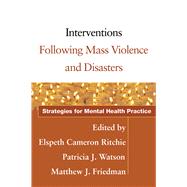Grounded in the best science available, this essential volume presents practical guidelines for effective clinical intervention in the immediate, intermediate, and long-term aftermath of large-scale traumatic events. Vital lessons learned from a variety of mass traumas and natural disasters are incorporated into the book's thorough review of strategies for helping specific victim and survivor populations. The editors and authors include over 40 leading experts in disaster mental health. Of crucial importance, they clearly summarize the empirical evidence supporting each intervention and provide other guidance based on experience and consensus recommendations.








